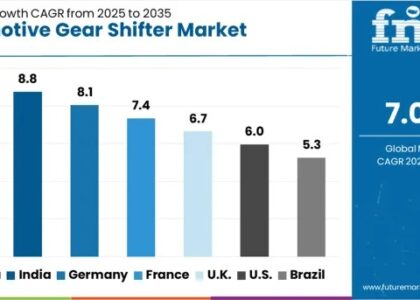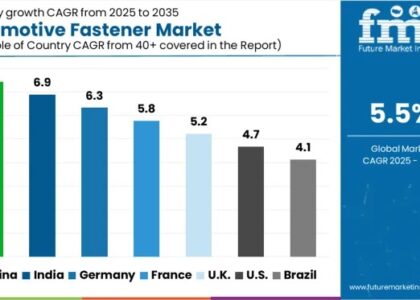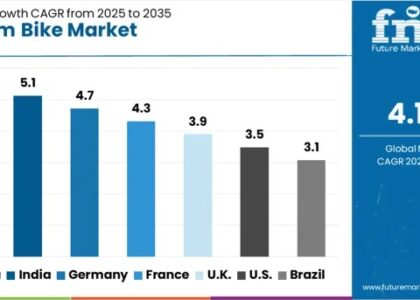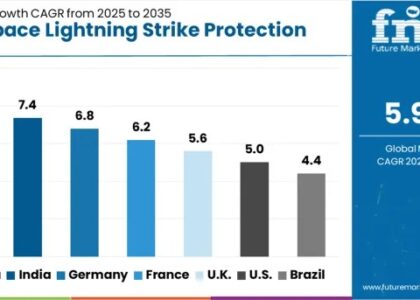
The market for genetically modified food is anticipated to expand significantly between 2023 and 2033, with a CAGR of 6.5%. The market value significantly increased from US$ 109,173.6 million in 2023 to US$ 196,516.8 million in 2033, reflecting this expansion. The market’s observed CAGR of 5.8% from 2018 to 2022 denotes a consistent rate of growth, while the projected CAGR emphasizes a promising rise, highlighting the market’s potential for growth and profitability in the years to come.
Due to a number of variables, the market for genetically modified foods has recently attracted a lot of interest. The rising global population, which has increased demand for food production, is one of the main causes. In order to fulfill the growing need for food, genetically modified crops provide better features, including increased production, resistance to pests and diseases, and tolerance to environmental conditions.
Get Recently Updated Report of Market as Sample Copy: https://www.futuremarketinsights.com/reports/sample/rep-gb-889
The market does, however, have some limitations and difficulties. Consumers and regulatory agencies have worries about the safety of genetically modified organisms (GMOs) and their possible environmental effects. Companies operating in this industry face difficulties due to more stringent rules and labeling requirements. In addition, barriers to commercial expansion include the complicated intellectual property landscape and ethical issues regarding GMOs.
The genetically modified foods industry offers several options despite these obstacles. There is potential for creating crops with enhanced characteristics, nutritional value, and flavor profiles thanks to advancements in genetic engineering technology. Consumer acceptance of genetically modified products is growing in certain areas, creating new market niches. Additionally, the opportunity to solve challenges with food security, cut back on agricultural inputs, and improve sustainability presents great prospects for businesses working in this industry.
Key Takeaways
- In the United States, the market is growing at a CAGR of 23.3% in 2022.
- The quest for sustainable and high-yielding crops is expected to increase demand for genetically modified food in the United Kingdom by 25.3% annually by 2033.
- Due to the government’s emphasis on increasing agricultural output through genetic modification, the market in India is predicted to develop at a CAGR of 4% by 2033.
- The need to address issues with food security and increase crop resilience in the face of changing climatic circumstances is expected to drive the expansion of the genetically modified food industry in China, with a CAGR of 11.1% by 2033.
- Japan’s market registered a compound annual growth rate of 3.7% in 2022.
Competitive landscape
The market for genetically modified food is characterized by fierce rivalry between major manufacturers vying for market dominance. In the market, notable rivals include DowDuPont Inc., Syngenta AG, Bayer CropScience AG, Monsanto Company, and BASF SE. These businesses carry out considerable research and development to increase agricultural productivity, disease and insect resistance, and nutritional characteristics. They create and market GM seeds and plants, primarily maize, soybeans, cotton, and canola.
Technological breakthroughs, regulatory frameworks, consumer acceptability, and environmental concerns are some of the variables that influence the competitive environment. In the manufacture of genetically modified foods, market participants also work to assure openness, sustainability, and adherence to safety requirements.
Key Companies Profiled
DuPont
Syngenta
Bayer Crop Science
Sakata
BASF Gmbh
Group Limagrain
KWS SAAT SE
Dow Chemical Company
Jivo Wellness Pvt. Ltd.
Ambar Protein Industries
Recent Developments:
- Company Monsanto is known for creating genetically engineered seeds, such as Bt cotton and Roundup Ready soybeans, to increase agricultural production and pest resistance.
- For a variety of crops, Syngenta AG offers genetically engineered characteristics for disease resistance, insect resistance, and herbicide tolerance.
- To increase production and sustainability, Bayer CropScience AG creates genetically modified crops, including insect-resistant maize and herbicide-tolerant soybeans.
- For crops like maize and soybeans, DowDuPont Inc. offers genetically modified features with an emphasis on traits for insect resistance, herbicide tolerance, and improved nutritional value.
- As a means to address agricultural issues and enhance crop performance, BASF SE specializes in genetically modified crops, such as insect- and herbicide-resistant potatoes and herbicide-resistant soybeans.
A Detailed Full Report: https://www.futuremarketinsights.com/checkout/889
Key Segments Profiled in the Genetically Modified Food Industry Survey
Genetically Modified Food by Type:
- Maize
- Soybean
- Canola
- Cotton
- Other
Genetically Modified Food by Trait:
- Herbicide Tolerance (HT)
- Insecticide Resistance (IR)
- Stacked Traits (ST)
Genetically Modified Food by Region:
- North America
- Latin America
- Europe
- Asia Pacific
- Middle East & Africa
About Future Market Insights (FMI)
Future Market Insights, Inc. (ESOMAR certified, recipient of the Stevie Award, and a member of the Greater New York Chamber of Commerce) offers profound insights into the driving factors that are boosting demand in the market. FMI stands as the leading global provider of market intelligence, advisory services, consulting, and events for the Packaging, Food and Beverage, Consumer Technology, Healthcare, Industrial, and Chemicals markets. With a vast team of over 400 analysts worldwide, FMI provides global, regional, and local expertise on diverse domains and industry trends across more than 110 countries.
Contact Us:
Future Market Insights Inc.
Christiana Corporate, 200 Continental Drive,
Suite 401, Newark, Delaware – 19713, USA
T: +1-845-579-5705
For Sales Enquiries: sales@futuremarketinsights.com
Website: https://www.futuremarketinsights.com
LinkedIn| Twitter| Blogs | YouTube





